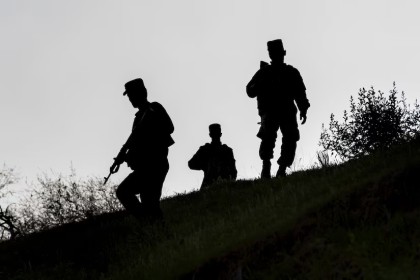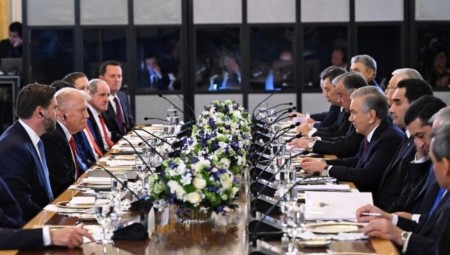The former U.S. President Donald Trump on January 19, a day before the end of his presidency, signed an executive order instructing on care of the veterans who served at the Karshi-Khanabad airbase (K2) in Uzbekistan between 2001-2005.
According to the order the Secretary of Veterans Affairs, in consultation with the Secretary of Defense, shall consider whether to designate veterans who served on active duty in Uzbekistan between October 1, 2001, and December 31, 2005, as veterans who served on active duty in a theater of combat operations pursuant to section 1710(e)(1)(D) of title 38, United States Code.
Also, within 365 days of the date of this order, the Secretary of Defense shall conduct a rigorous study investigating toxic exposure by members of the Armed Forces deployed to the Karshi-Khanabad Air Base, Uzbekistan (Air Base), between October 1, 2001, and December 31, 2005. The Secretary of Defense shall submit a report summarizing the findings of the study to the President, through the Secretary of Veterans Affairs. The study shall include the following elements:
- A detailed assessment of the conditions at the Air Base between October 1, 2001, and December 31, 2005, including identification of any toxic substances contaminating the Air Base during such period, the exact locations of the toxic substances, the time frames of exposure to the toxic substances, the service members exposed to the toxic substances, and the circumstances of such exposure.
- A rigorous epidemiological study of any health consequences for members of the Armed Forces deployed to the Air Base between October 1, 2001, and December 31, 2005. This study shall be of equivalent rigor to studies used by the Department of Veterans Affairs to make determinations regarding diseases subject to presumptive service connections.
- An assessment of any causal link between exposure to any toxic substances identified in subsection (a) of this section and any health consequences studied under subsection (b) of this section.
After the terrorist attacks of September 11, 2001 and the creation of a "global anti-terrorist coalition" under the auspices of the United States, the Karshi-Khanabad airbase was transferred to the US Department of Defense for air support for operations in Afghanistan and the supply of food and military equipment to the American troops. Over the period 2001-2005, 7,000 US troops were stationed there.
A November 2001 baseline study noted that the ground around the base was contaminated with aviation fuel, "likely due to a leaking Soviet-era fuel distribution system," asbestos and treated low-level uranium from the destruction of Soviet missiles a few years earlier.
Veterans described the "black mucus" oozing from the soil as "a mixture of solvents, oils and other chemicals." There were also reports of toxic fumes, radiation warning signs and a body of water that glowed green. The rainwater reportedly flooded the tents and was contaminated with various chemicals, CNN reported.
“After returning from the fighting, years later, we all develop various forms of cancer that [the Department of Veterans Affairs] refuses to recognize,” said Scott Welch, a retired former warrant officer and special operations military intelligence officer deployed to K2 in October 2001. of the year. In 2014, he was diagnosed with thyroid cancer, McClatchy reported.
The documents were declassified at the request of Stephen Lynch, the Democratic Member, the Chairman of the House Committee on Oversight and Reform, and the Republican Congressman Mark Green. Stephen Lynch said this is necessary to help K2 veterans to “better understand what they may have encountered during their service” and make informed health decisions.















